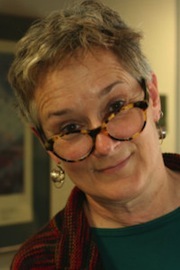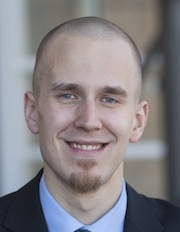‘Ask a Lawyer’ prison sessions example of law in action
Several times a year, a team of University of Wisconsin Law School professors and their students deliver some truth to Wisconsin prison inmates.

Michelle LaVigne
Michele LaVigne and Adam Stevenson, both clinical professors at the UW Law School, have been traveling to prisons around the state to conduct “Ask a Lawyer” sessions with inmates. Students from the Legal Assistance for Institutionalized Persons project join them, both to assist with the sessions and to learn about lawyering.
The prison visits are part of a non-denominational restorative justice project operating out of Madison’s First Congregational United Church of Christ.

Adam Stevenson
The project brings together offenders, victims and the community with the goal of repairing relationships damaged by crime. LaVigne and Stevenson stand in for the community.
“Restorative justice is meant to bring hope,” says Stevenson. “What we’re trying to do is make hope reasonable, bring a bit of reality to that hope, dispel myths and help inmates self-identify the issues and opportunities they face.”
He describes the sessions as “truth in action,” a play on the “law in action” educational tradition for which the UW Law School has become known. And for inmates looking to reduce or overturn their sentences, hearing the truth of their situations can be a hard but necessary step in the restorative justice process.
Sometimes the Q-and-A’s reveal that an inmate received unfair treatment in the criminal justice system, and the Law School team can suggest how to begin righting the wrongs. Other times, inmates learn they did, in fact, get due process.
Both outcomes are victories, Stevenson says.
“When we achieve understanding, even when it means inmates realize they did receive a fair shake, and everything that could be done for them has been done,” Stevenson says, “they can finally come to grips with the situation and move on.”
Restorative Justice Project Director Jerry Hancock, a 1971 graduate of the Law School, says that beyond their gift of service, LaVigne and Stevenson also get something back. Their teaching and practice are informed by their prison visits, insights they couldn’t get anywhere else, he says.
Stevenson agrees. He says the experience has kept him in touch with the kinds of common legal misunderstandings that develop in the prison community and helped him figure out how to correct them.
“The same goes for our students,” Stevenson says. “They’re learning what it takes to translate complex legal processes for a given audience. These are skills they’ll use whether or not they go into criminal law.”
And inmates say they value the sessions. As one recent participant wrote, “It was nice to get some straight forward advice from some nice as hell, no nonsense, cool as heck people. So please, with all my heart and soul, thank you so very much.”
– By Tammy Kempfert
Subscribe to Wisconsin Ideas
Want more stories of the Wisconsin Idea in action? Sign-up for our monthly e-newsletter highlighting how Badgers are taking their education and research beyond the boundaries of the classroom to improve lives.
Tags: Law School, The Wisconsin Idea
